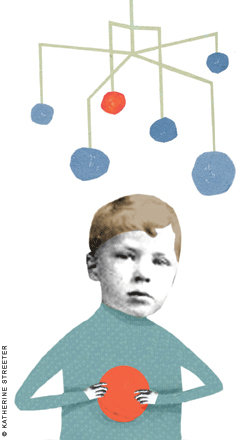
Paul Offit doesn’t look like the kind of person who inspires hate mail. Gray-haired and slightly rumpled, neither does he seem a likely candidate to play Defender of Science against a celebrity-studded medical crusade. Yet with the publication of a new book, Autism’s False Prophets: Bad Science, Risky Medicine, and the Search for a Cure, the Maurice R. Hilleman Professor of Vaccinology has found himself at the center of a maelstrom of controversy.
Offit’s argument is straightforward. He contends that childhood vaccines are safe and that there is no scientific basis for the notion that they cause autism. This puts him in tune with most of the public-health and medical establishment, including the Centers for Disease Control and Prevention (CDC). Yet as Gregory Poland, chief of vaccine research at the Mayo Clinic, told The New York Times, “Paul is a lightning rod, a figure who goes charging into the fray.”
Hence the hate mail.
Autism’s False Prophets is in part a response to a controversial theory proposed in the British medical journal The Lancet in 1998, by a charismatic doctor named Andrew Wakefield. Wakefield suggested that the measles-mumps-rubella (MMR) vaccine caused autism. His theory has since been discredited, and Wakefield has been investigated by the British General Medical Counsel on charges of falsifying data and scientific fraud. But that didn’t diminish the theory’s grip on a group of predominantly non-scientist advocates.
“When I appeared on television and was quoted in newspaper and magazine articles saying that vaccines didn’t cause autism, my life changed,” Offit writes in the book’s introduction. “While I was on a federal advisory committee to the CDC—one that had made recommendation about the use of the mercury-containing preservative thimerosal in vaccines—I got a death threat.” An FBI investigation found the threat credible, so the advisory committee hired an armed guard for its meetings for the next few years. In 2006, Offit had to pass by an anti-vaccine rally to get to another CDC event. One protester brandished a sign with a photo of Offit’s face and the word terrorist in large red letters.
Several celebrities have aligned themselves against Offit and the medical establishment he represents. Robert F. Kennedy Jr. has accused the CDC of covering up evidence linking vaccines to autism, and actress Jenny McCarthy is a public spokesperson for Generation Rescue, an organization supporting the vaccine-autism connection.
Offit first became concerned about changing public attitudes toward vaccines after a measles outbreak in Philadelphia in 1991. The disease, which had been eradicated for almost 30 years, had resurfaced because parents were choosing not to vaccinate their children against it. Over the next few years, Offit noticed a dramatic increase in children being treated for other vaccine-preventable diseases at Children’s Hospital of Philadelphia (CHOP), where he is chief of the infectious diseases department. Kids were presenting at the hospital with whooping cough; pneumonia caused by whooping cough; severe skin infections from pox-related complications; and meningitis caused by Haemophilus influenzae type b (HIB), a preventable infection that killed an infant in Minnesota last year.
“The percentage of parents choosing to withhold, delay, or separate vaccines has increased dramatically over the last 10 years,” says Offit. “It could be as high as 15 percent of parents. That’s a problem.” He founded the Vaccine Education Center at CHOP in 2000 to address the issue.
The first third of Autism’s False Prophets chronicles the way Wakefield’s controversial theory rose and fell, based on personal charisma and dubious science. Offit then delves into the two other major stages of the vaccine-autism debate. The next popular theory was that thimerosal, a preservative used in many vaccines prior to 2001, caused autism. That morphed into the overload theory: that taking too many vaccines at once caused autism. Subjecting all three to the “marvelously self-correcting” gaze of disciplined science, Offit finds the theories lacking.
The book has begun to gain traction. TheNew York Times credited it with “galvanizing a backlash against the anti-vaccine movement in the United States.” The vaccine-autism connection has been on trial in the court of public opinion for a decade, and for the last few years it has been on the federal docket as well. Special masters of the U.S. Court of Federal Claims have conducted multiple evidentiary hearings in the Omnibus Autism Proceeding, a large class-action lawsuit brought under the auspices of the Vaccine Compensation Program. Offit is an expert witness for the defense in this “vaccine court.” February 2009 marked what Offit calls “a victory for American children” in that the court rejected the claim that thimerosal causes autism. The same week, The Sunday Times (UK) reported that Andrew Wakefield “changed and misreported results in his research,” falsifying data in his Lancet study linking MMR vaccine and autism, according to evidence presented before the British General Medical Council.
Offit sees the U.S. vaccine court decision as pivotal. “It’s a confirmation of the science,” he says. “When the court supports science, it makes it easier to explain science to the public. People see the courtroom as an independent arbitrator.” He predicts that the decision will herald the victory of science over pseudoscience. “The ‘vaccines-cause-autism’ hypothesis is largely dead,” he said in an interview. “My reaction? Joy! Absolute joy.”
Offit didn’t start his scientific career intending to become a figurehead for a public-health crisis. An internationally renowned expert in rotavirus-specific immune responses, he is the co-inventor of the rotavirus vaccine RotaTeq, for which he received the Jonas Salk Award from the Association for Professionals in Infection Control and Epidemiology, among other awards. A diarrheal disease, rotavirus kills 600,000 children in poor countries every year, according to the World Health Organization.
Part of the difficulty of his new public role, Offit confesses, is learning to speak what amounts to a different language. “Frankly, it counters all your instincts,” he says. “A good scientist will rigorously define a hypothesis, establish burdens of proof, subject that proof to statistical analysis, and then will be very careful. As a scientist, you say what your data allow you to say—your discussion never exceeds your results. That does not play on Larry King Live or Oprah. [In those venues] you have to be willing to say, ‘Vaccines don’t cause autism, MMR vaccine doesn’t cause autism, thimerosal doesn’t cause autism’—even though technically the science never allows you to say that.”
“There’s always a fear that the science gods will strike you dead,” Offit adds with a grin.
Provided the science gods spare him, Offit will be able to enjoy one surprising consequence of his new book: fan mail. Now parents of autistic children write to thank him, as do physicians. “Thank you for providing a well-thought-out, alternative response to the screaming snake-oil merchants and the media coverage they attract,” wrote one such fan, the parent of an autistic child. “Had I read your book 15 years ago, it would have saved me time and money. Maybe now we can finally begin to put more faith into science.”




